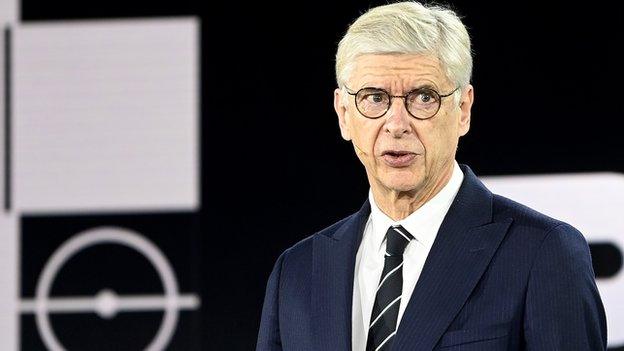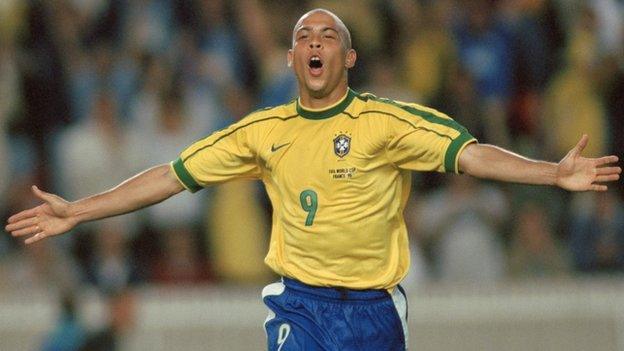Arsene Wenger's World Cup plan - what is it all about?
- Published

Arsene Wenger stepped away from football management in 2018, and became Fifa's chief of global football development
Arsene Wenger says he is "100% convinced" his plan for a new international match calendar based on a World Cup every two years is the best way forward for the game as a whole.
Europe's major leagues have already declared their opposition to the proposals, with La Liga president Javier Tebas saying they are "a threat to the overall tradition of world football".
Over the past week former Arsenal boss Wenger has been speaking to scores of prominent former players in Doha in his position as chief of football development at world governing body Fifa.
And he outlined the plan he feels will provide the structural change needed to reduce the number of matches and travelling involved at the top level, while delivering more meaningful games.
"I am 100% convinced it is the right solution," he said.
"In football, if you don't play big competitions, you will play small competitions - don't think we won't play.
"Because this proposal respects the current 80/20 balance between club and international football, I would sign with two hands if I was in a club."
Wenger's grand plan
There are few people involved in football who argue against major reform of the international match calendar.
After 166 member associations voted to approve a feasibility study when it was proposed by the Saudi Arabian federation, Wenger was tasked by Fifa president Gianni Infantino with finding the best way to change it.
The former Arsenal boss has a number of ideas, including:
A biennial World Cup in even years.
Confederation tournaments (including the European Championship) in odd years.
Either one (October) or two (October and March) mid-season international breaks, for a month in total, when qualifying for major tournaments will take place. Groups of four countries are envisaged, with a play-off, for a maximum of seven matches.
Guaranteed rest periods for players once tournaments are over.
According to Wenger, this would reduce by half the amount of travelling players have to undertake.
"Today's calendar is outdated," he said. "We want to organise it in a more efficient way.
"The current four-year cycle was established in 1930, yet 133 countries have never been at the World Cup."

Former Brazil star Ronaldo is one of scores of players who Wenger has been speaking to
The positive spin-offs
Wenger spoke about "his baby", which is to "give every talent a chance".
He believes young players do not have an equal chance to fulfil their potential because of where they are born. Put simply, the richest countries have the best youth programmes.
According to Wenger, a World Cup every two years would generate more money that could be invested globally.
"We want to provide an incentive to invest in youth programmes," he said. "We know the quality of work at youth level has a deep correlation with senior level."
The opposition
The World and European Leagues bodies are opposed, while La Liga chief Tebas says the proposed calendar changes "would disrupt the domestic leagues to the extent that interest would be lost and continuity jeopardised".
"This would have a cascading effect on the entire football pyramid, with fans losing interest in the sport," he added.
It has also been suggested the World Cup as a product would be diluted, while, in an interview with The Times,, external Uefa president Aleksander Ceferin stated European nations and those affiliated to the South American Conmebol Confederation, may boycott the entire thing.
However, these comments contradict a statement made less than three years ago by Conmebol president Alejandro Dominguez,, external saying his organisation had proposed a biennial World Cup to Fifa.
Those in support
The general view is that there are enough countries who stand to benefit from Wenger's proposals for them to get through.
Evidently, the politics involved are clouding the debate, putting competing interests against each other just months after they were united in attacking the doomed European Super League plan.
Wenger rejects the claim of tournament dilution by pointing out the impact of Covid-19 means this year's major international competitions in Europe, South America and North America will be followed by a World Cup next year.
Legendary Brazilian striker Ronaldo observes that the Champions League retains its attraction despite being an annual competition.
Former Australia and Everton star Tim Cahill admitted Fifa is a big supporter of the Aspire Academy in Qatar, where he is chief sports officer.
However, after speaking to fellow former professionals in Doha this week, he is adamant Wenger's plans benefit the game as a whole.
"Listening to each other's stories and understanding the emotion, a lot of us started to think holistically rather than personally," he said.
"I spoke to [former Wigan and Reading keeper] Ali Al-Habsi, who spent 19 years trying to qualify for a World Cup [with Oman] and never made it - 133 countries never have.
"I know from personal experience how difficult all the travelling is when you combine international football with playing in the Premier League.
"Then there are the qualifiers. It takes Australia three years to qualify for a World Cup - you do it in Europe in a year."
When will the decision be made?
Wenger hopes the consultation process will be concluded by the end of the year. Any final decision on the proposal will have to be made by a Fifa Congress, which usually takes place in May.